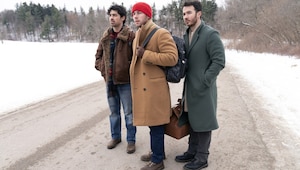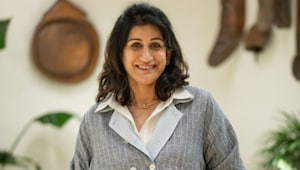“A Year After Section 377 Was Scrapped...”
Cosmo columnist—an outspoken Indian lesbian—looks back at how things have changed (or not) since 6 September 2018.

“That I don’t hold hands in public unfailingly irks my partner. Last year, on 6th September, when the LGBTQIA+ Indians ‘awoke to life and freedom’ after the Supreme Court struck down Section 377, thus, decriminalising consensual sex between same-sex adults, my phone beeped with a teasing message: ‘Now, will you hold my hand?’.
Holding hands could be an excellent place to start, now that I have the permission from the highest law of the land. But it’s a difficult psychological jump—partly because I lack the adorable propensity for PDA, but mostly because my queer self is still negotiating the terms of when to fit in and to stand out.
The more conversations I have with my queer female friends about life post-377 India, the more I am convinced that our feelings of ambivalence are interlinked. We have the approval of LGBTQIA+ rights on paper, yet we live in a morally vociferous majoritarian society that still can’t fathom two women getting married, adopting a child, or buying property together.
In the context of clinical counselling and mental health programmes, however, there’s a profound indication that something has changed. There are institutional resources available for the LGBTQIA+ community now that didn’t, quite deliberately, exist earlier. Counsellors, today, are aware and informed to not treat non-heteronormative behaviour as a variation of an illness, but to see it as normal, and help individuals and families to adjust. But these initiatives are limited to India’s urban cities only.
The Mumbai Pride hosted one of the biggest marches in February, led by young lesbian and non-binary women in overwhelming numbers. This was quickly followed by triumphant coming-out stories, starring women of immense defiance and determination. Olympian sprinter Dutee Chand announced that she’s in a same-sex relationship, making her the first gay athlete in India to openly own up to her sexual preference, despite the compelling risks of prejudice, losing out on sponsorships, and even personal safety. Weeks later, Menaka Guruswamy and Arundhati Katju made history by coming out as a couple—becoming the first publicly gay women lawyers in India. ‘Too often, we come to believe, as women or LGBTQIA+ or just as citizens, that our stories are not important. But it’s our common humanity—our common stories of love and loss—that unites us,’ Arundhati said in a poignant TedXTalks speech recently.
Stories matter. When you’re able to speak freely and fearlessly, and know that your words are met with open hearts and minds, you can talk about your identity in engaging ways. Gaysi Family, a blog launched in 2008, was based on this idea of shared storytelling, covering gender identities, classes, and cultures. Its Co-Founder Sakshi Juneja tells me that, post-377, the site’s focus is now on engaging as many diverse identities residing in tier-two and three cities as possible—through personal narratives, either original or translated from English into regional languages. The platform gets more than 15,000 hits per day, proof that a thriving queer community exists in the country.
Gaysi Family is not directly involved in activism or changing policies. Their main concern, Sakshi says, is to curate safe spaces for social dialogue and meet like-minded folks. Speaking to her, it became clear that there are no shortcuts to changing societal attitudes and behaviour. ‘As long it’s the neighbour’s kid who’s gay [not theirs], they are [society] supportive. I think it’s a very Indian thing,’ she adds, jokingly.
A parallel set of opinions believes that we can cultivate a real change in our society from inside out, by inculcating cultural shifts at our places of employment, so people don’t feel the need to leave their diversities at the door. Sharing stories about sexuality and gender at workplace is tough, though. Not just because of the subject, but also since we are trained to keep our personal life and/or orientations private during office hours. ‘When it came to even a basic awareness session, organisations, previously, had the excuse of ‘But the law doesn’t permit it’,’ says Swetha Harikrishnan. She is an openly queer ally based in Bengaluru, a part-time activist with a day job as Director, Human Resources, at HackerEarth, a homegrown technical recruitment platform.
Her definition of inclusivity at work is to not create a separate vertical, rather an integrated space. Companies need to stop isolating differences, she advises. As part of her HR-driven sensitisation and inclusivity programmes, she decided to introduce My Story in June every year, to coincide with the international Pride Month. Here, she invites all employees, not just from the LGBTQIA+ community, to share their personal stories.
Swetha recalls being asked, ‘Is it [sexual orientation] natural?’, by someone in the audience. This oddly appropriate enquiry is where we stand today. But these questions can also be the beginning of educating mindsets. And it’s all a part of the pleasant chaos that’s life post-377.”
more from Relationships

Is 'future faking' the new gaslighting? Decoding this new dating trend

Bad at gifting? Check out these stocking stuffer ideas based on each zodiac sign

15 new Christmas movies you might want to add to your 2025 holiday watch list

Why glycolic acid is your skin's best friend for the winter season

How training for a marathon became the most honest conversation I have ever had with myself

Emily in Paris season 5 is back—and we’re still hate-watching every minute of it

Women have long been having sex on the first date—so why do some of us still feel shamed?

The 'shixie' is a modern take on the 70s shag haircut: 10 style ideas and how to wear the trending look

Why blush balms are the low-effort glow stick for fuss-free radiance

These are the most Googled dating and relationships questions of 2025—and, er, it’s been an anxious year
